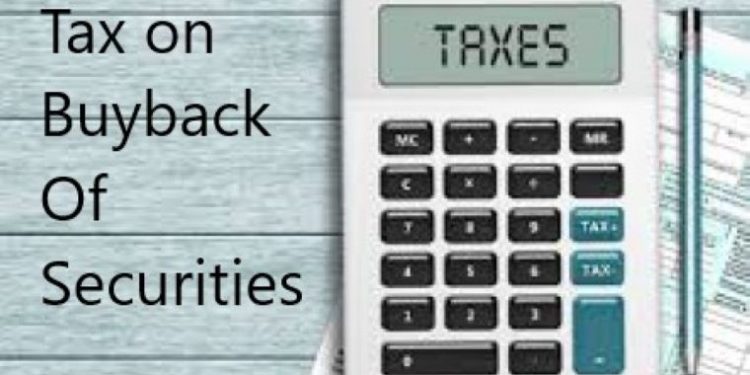Section 115QA was inserted by Finance Act 2013 to deal with buy back of securities but it only covered unlisted securities represented as below:
“(1) Notwithstanding anything contained in any other provision of this Act, in addition to the income-tax chargeable in respect of the total income of a domestic company for any assessment year, any amount of distributed income by the company on buy-back of shares (not being shares listed on a recognised stock exchange) from a shareholder shall be charged to tax and such company shall be liable to pay additional income-tax at the rate of twenty per cent on the distributed income.
“distributed income” means the consideration paid by the company on buy-back of shares as reduced by the amount which was received by the company for issue of such shares.”
Simultaneous amendment was made to make such amount tax free in the hands of shareholder by introducing section 10(34A) which is represented as below:
“any income arising to an assessee, being a shareholder, on account of buy back of shares (not being listed on a recognised stock exchange) by the company as referred to in section 115QA”
However now after the amendment made by Finance Minister Nirmala Sitharaman in the budget on 5th July 2019, now even the buy back of listed securities is covered by section 115QA and is exempt in the hands of shareholder u/s 10(34A).
Let’s first understand why this step was taken:
The erstwhile finance minister, P Chidambaram, in Budget 1997, introduced dividend distribution tax (DDT) to reward companies investing in future growth. Dividends distributed are currently taxable at a little more than 20 per cent.
To escape dividend distribution tax, listed companies were resorting to buybacks, as they were more tax effective because tax on sale of shares was either short term capital gain which was at slab rate in case of buy back or long term capital gain taxed at 20% with benefit of indexation for buy back not done through stock exchanges.
In fact, after FY16-17, buybacks became more popular as dividends amounting to more than ₹10 lakh were made taxable in the hands of shareholders (at the rate of 10 per cent u/s 115BBDA).
Even after re-introducing long term capital gains tax on equity shares (on gains in excess of ₹1 lakh in a financial year) at 10 per cent in Budget 2018-19, buyback was a preferred option.
In 2018-19, as per official data, 60-plus companies went in for buybacks, including large IT companies such as TCS, HCL Tech, Tech Mahindra, besides ONGC, BHEL, Oil India, Coal India and NMDC.
To plug the differential tax treatment between buybacks and dividend payouts, the Budget has introduced tax on buybacks for listed companies as well. The 20 per cent tax will be levied on the difference between the issue price and the buyback price of the share.
Now let’s see what was the scenario before this and how this will affect the taxability:
Before this amendment if a person had purchased a share at Rs. 100 of a company and later it was bought back by the company at Rs. 500 then the individual would have to pay long-term capital gains tax at 10 per cent or short-term capital gains tax at 15 per cent on the Rs 400. However, now if an individual has subscribed to a company in IPO stage at Rs 100 and subsequently the company announced a buyback a Rs 500, the company would pay the buyback tax at 20 per cent on Rs 400 (i.e. buyback price less issue price).
Therefore, now an individual has been saved from paying tax and other formalities but because of this provision now there would be cases of double taxation as the provision takes into consideration amount received by company which was true in case of unlisted companies but in case of listed companies one share can be easily traded after it’s issue. Let’s understand this with an example:
If Mr X purchased shares of XYZ on stock exchange at Rs 500 from Mr Y which Mr B had originally subscribed under IPO. ABC announced buyback at Rs 900. Here the original issue price of the shares was Rs 100.
In this scenario, ABC would be paying 20 per cent buyback tax on Rs 800 (i.e. Rs 900 – Rs 100). It would be pertinent to note that Mr B would have already paid a long-term/short-term capital tax (@10%/15%) when he sold the shares to Mr A on the difference between Rs 500 less Rs 100. Total tax to the government kitty in this case would be Rs 200 (i.e. 20 per cent tax on 800 paid by ABC and 10 per cent tax on Rs 400 paid by Mr B). This would result in double taxation. The question is whether this is unintended or intentional and whether government would bring some amendment under this section for listed securities?
If you need assistance you can ask a question to our expert and get the answer within an hour or post a comment about your views on the post.













